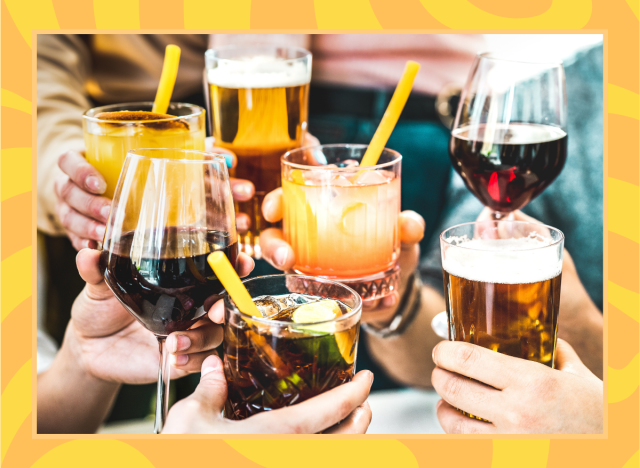The #1 Worst Drink For Inflammation, Says Dietitian

Chronic inflammation is a common condition that can wreak havoc on your body. It can cause everything from uncomfortable health issues, such as joint pain or stiffness, abdominal pain, and fatigue, to more serious, life-threatening chronic diseases.
“Chronic inflammation has been linked to diseases like cancer, obesity, heart disease, diabetes, and even depression,” says Amber Pankonin, MS, RD, a registered dietitian and owner of food blog the Stirlist.
There are many factors that contribute to inflammation and disease—both those that you can’t control, such as genetics, as well as lifestyle factors that you can control, such as diet, according to Pankonin.
If you’re looking to reduce inflammation, there are a number of things you can do, including exercising and making dietary changes; for example, you can give up foods that contribute to inflammation and increase your intake of anti-inflammatory foods. Pankonin notes that there are several studies that point to how certain nutrients like heart-healthy oils, polyphenols, and antioxidants may help reduce inflammation in the body.
Besides being mindful of your food intake, it’s important to know that what you drink can also contribute to reducing or worsening your inflammation. And there’s one drink, in particular, that may be the worst culprit of causing inflammation: sugary cocktails.
Read on to learn more about how sugary drinks are linked to chronic inflammation, and for more on how to manage inflammation, check out the #1 Drink That Reduces Inflammation.
Why the #1 worst drink for inflammation is a sugary cocktail.

“Any cocktail or alcoholic beverage that contains a high amount of sugar and alcohol would not be recommended if you’re trying to reduce your risk of chronic inflammation,” says Pankonin.
Alcohol has been studied to specifically promote intestinal inflammation, while sugar has been studied to increase inflammation.
“Alcohol can impact sleep quality and may weaken your immune system,” adds Pankonin.
READ MORE: Ugly Side Effects of Drinking Alcohol Every Day, According to the Mayo Clinic
Some of the worst sugary cocktail offenders
You may not realize how much sugar you’re consuming when you have these popular alcoholic beverages:
- Alcoholic malt beverage, like Smirnoff Ice or Mike’s Hard lemonade (1 can or bottle, 12 ounces): 245 calories and 35.2 grams of sugar
- Rum cooler, like Bacardi Breezer (1 can or bottle, 12 ounces): 257 calories and 36.9 grams of sugar
- Frozen margarita (1 cup): 274 calories and 36.2 grams of sugar
- Pina colada (1 cup): 340 calories and 39.6 grams of sugar
- Frozen Daiquiri, like Master of Mixes Mango Daiquiri Mix (4 ounces): 200 calories and 45 grams of sugar
For context, the American Heart Association recommends limiting added sugars to no more than 6 percent of calories each day, which is the equivalent of 25 grams of sugar per day for women or 38 grams of sugar for men. With that in mind, having just one of the above cocktails will cause you to hit your limit of added sugar per day.
Do you have to give up alcohol completely to lower inflammation?
If you’re still looking to imbibe an alcoholic drink, instead of a fruity cocktail, Pankonin suggests you order a glass of red wine, which is much lower in sugar. One serving of table red wine (5 ounces) only contains about 0.9 grams of sugar.
“A glass of red wine will still contain alcohol, but it would contain some polyphenols (a type of antioxidant that’s been found to fight inflammation) and be lower in sugar compared to a fruity cocktail,” says Pankonin.
Keep in mind…
“It’s still important to consume [alcohol] in moderation,” adds Pankonin.
The Dietary Guidelines for Americans recommends no more than 2 drinks per day for men and 1 drink per day for women.